Love is patient, love is kind… It always protects, always trusts, always hopes, always perseveres. – from 1 Corinthians 13:4-5
“I’ve never seen such devotion.” These are the first words my mother says when I ask her to describe our friend Bob Cogan, who turned 96 this year. Bob is straight-forward, ethical, and kind. As my mom says: “He is a good man.”
We first met Bob and his wife Margaret in 2015. Margaret had had a bad stroke and Bob was determined to do everything he could to help her recover. At 88 years old, he oversaw every aspect of her care: organizing and attending all of Margaret’s doctor visits, advocating for her — including making sure that Margaret never went to a rehab facility again (after a disappointing post-surgery experience) and, instead, trained himself to care for her at home; managing all of her physical therapy exercises and medications; cooking all her meals; supporting our caregivers in their care — and that’s just touching the surface of things.
Bob was at Margaret’s side, all day, every day, 365 days/year. He was like a rock, untiring and unmoving, and a bridge connecting her to her pre-stroke life. No matter what happened, what turn Margaret’s health might take, Bob would be there. Anyone who spent time with the Cogans couldn’t help but be moved by Bob’s evident all-encompassing dedication to his wife.
(Despite all of the care, doctors, love, and therapies, Margaret passed away in 2017. She and Bob were married 55 years.)
Even though Bob told me “friendship” really isn’t the right word to describe their relationship — “it was way beyond that,” he said — I kept thinking, in my conversations with Bob, and in putting this piece together, what a precious friendship he and Margaret had.
I also really wanted to see what advice Bob might be able to share with others about how to have a long and happy marriage, which seems such an elusive thing these days! I know so many young couples who split up during the pandemic; and in general, life-time marriages seem more and more a thing of the past.
Bob’s advice was, of course, practical and down-to-earth, like Bob, himself: be good, do good; make sure you share values; take care of others; practice trust; be honest; communicate; be kind.
I hope you enjoy learning from Bob’s life as much as I have.
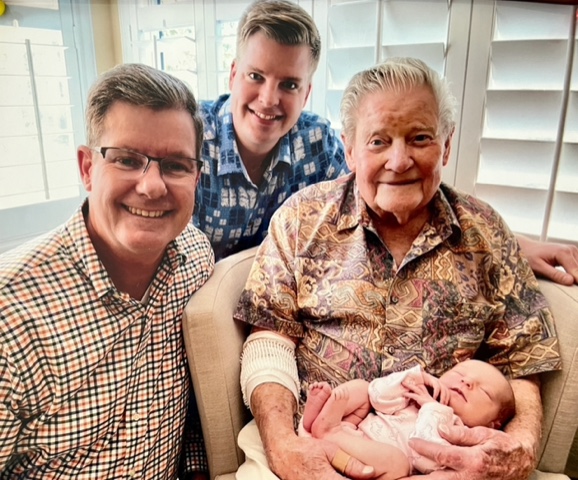
Growing up in LA in the 1930s & 40s
Kate: Bob, tell me a little bit about your childhood. Where did you grow up? And what was the neighborhood like where you grew up?
Bob: I grew up in Los Angeles. It was a hundred percent safe. You could leave anything out, and it would be there the next morning.
We always had a dog and the dog ran loose. Our junior high school was about a mile from home, and the dog would meet us at 3:30 each afternoon after school. We’d ride our bikes and we’d get to about three or four blocks away from home and he’d be there, waiting for us.
We were lucky to be raised in the society that we were raised in. Dr. Storch, who is my main doctor, said I lived in the best hundred years of this country. I believe it. [See Why Do We Call Them the Greatest Generation? by Legacy Senior Living]
My older brother and I were also always building and making things.
Kate: What kind of things would you make?
Bob: You name it. When we were younger we made lots of airplanes, model airplanes. Then after the war, when we got out of the service, we figured out a way — I don’t know where we first got the idea — we used high altitude bomber breathing devices to go underneath the water. We converted them to use underwater, including the tank and everything. You couldn’t buy them then; there was nothing on the market.
I also built Margaret’s and my bed. And I made this table we’re sitting at.
[My mom and I are big fans of Bob’s art. In his and Margaret’s home in Huntington Beach you can see wire sculptures he’s made, a nativity scene, and other pieces.]
Kate: Did you learn these things in school or were you just naturally somebody who liked to build and make things?
Bob: Well, I majored in industrial arts in college. But growing up in the 30s and 40s my dad had his wood saws and we were always in the garage doing something. He taught both of us how to use the tools, what they were called, and how to use them right. He had a lot of information and we learned from him
Kate: What were your parents like?
Bob: My dad was always there, but working. My mother was the main one I was close to. She was the one who managed the house. And she was the one who managed the finances. My mother was always there, but low-key, not bossy. I never heard her yell at me or my siblings ever. And I never heard my parents argue.
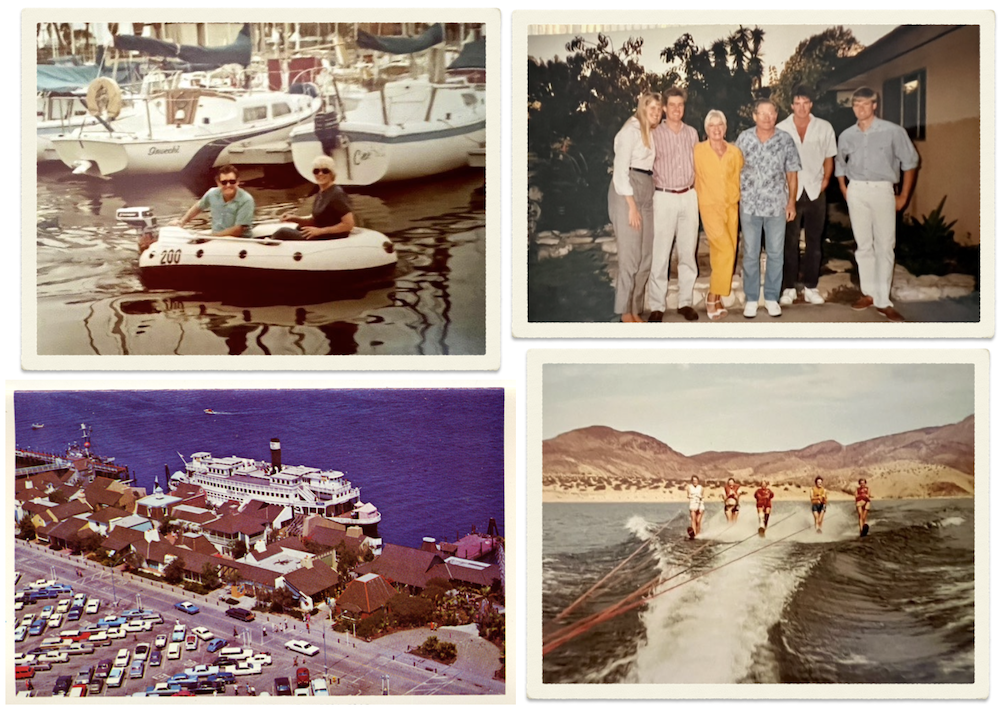
Bob’s Parents Helped Look after Others During the Depression
Bob: My mother and my dad also had a lot of people over for Saturdays and Sundays for food — this was during the Depression. My mother would cook for people. And she would pay for their water, milk bills, and other things they might need.
Kate: That’s beautiful Bob. You had a really special mom.
Bob: Yeah. My mother also taught me how to cook and run a kitchen.
Kate: Could you tell me more about that? Did you just say: Mom, teach me how to do this; I want learn to do this?
Bob: Well, I would be in the kitchen a lot. I always enjoyed cooking with my mother. And I’d see what she did. And I’d ask her questions: how do you do that; how do you know how long to cook a carrot — which saved my life when I was in the army.
Kate: How did that save your life when you were in the army?
Bob: I was a mess sergeant in a military police unit in Puerto Rico, before the war. I knew I didn’t want to spend my time in the bars, breaking up fights between the Army and the Navy and being around drinking and the women. So I volunteered to manage the kitchen there. And I loved that. I didn’t have to go around with the baton and hit people over the head!
Kate: Did you grow up with religion? Was your parents’ home a Christian home?
Bob: I think you would call it a Christian home. When I was in elementary school and middle school, we went to church every Sunday with my mother. My dad generally didn’t go. But regardless of how much or how little we participated it was always in the background. I’d say it was a foundation in our lives.
Bob’s Mother Was His Main “Teacher” in Life
Kate: Bob, your approach to your and Margaret’s marriage, did you get that foundation from your parents? Or the church?
Bob: My mother, the example she showed. My mother, in particular, was my teacher. Especially when my sister, who is four years younger than I am, when she was born she had dislocated hips. And doctors didn’t know how to deal with that back then like they do now. She had surgery when she was four years old. I was eight years old then and I remember my mother, how she cared for my sister. She never complained.
My mother was a small woman and she had to move my sister around, lift her up, you know. My sister was in a cast — both legs were in a full cast with a bar across. And my mother had to move her around and do everything for her. So that was a powerful example for me. She never talked about it, but I watched. She never complained and she never raised her voice. So that’s where I learned a lot about life.
Life with Margaret: A Chance Connection Brought Them Together
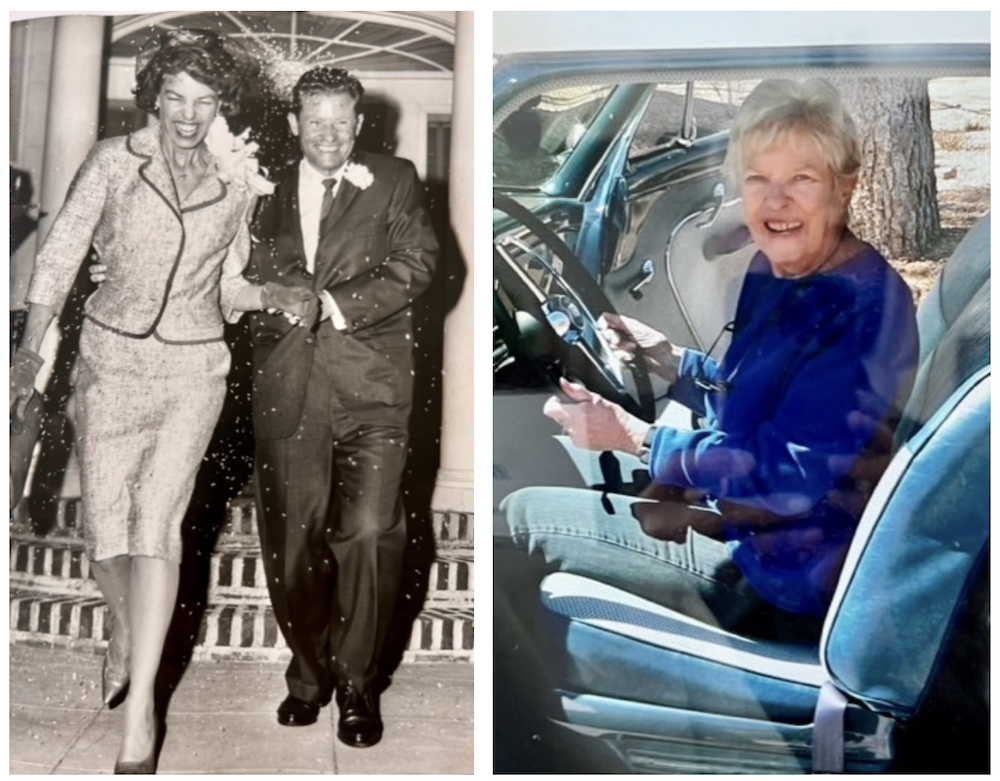
Kate: How did you and Margaret first meet?
Bob: I was working on my master’s degree at Cal State Long Beach in Industrial Education and the vice principal came to me one day at school and asked me if I was interested in the phone number of a woman. I said, not really, I’m basically exhausted and don’t have any time. I was exhausted because I was supposed to graduate in June but I was way behind, partly because of the counselor. It was his first job and he had just gotten his doctorate and I was his first “patient.” And he hadn’t given me the directions I needed.
But I agreed. I said yes, I would call her. The vice principal was the husband of one of Margaret’s childhood friends — that was the connection. Margaret went to kindergarten with his wife.
So anyway, I think I called her in two weeks and we talked for maybe 20 minutes. It was an easy conversation, and I’m not a conversationalist at all. I don’t get into conversations with strangers at a party. I develop a relationship slowly, especially at first. But the phone call went great. And one of the things I really liked was her voice. I had lost a bunch of hearing during infantry training — I wasn’t in the war, but I was in the army and during infantry training at Camp Roberts in Central California, they blew up a bunch of stuff maybe six feet away from me.
So I was never comfortable at parties because I missed so many of the words. But Margaret’s voice was not high-pitched like some women, which are more difficult for me to be around. Margaret’s voice was low-pitched, and soothing to my kind of hearing. So that was the first thing I noticed.
I think a couple of weeks later I asked if I could pick her up and we could go have a cup of coffee. We talked for an hour and a half or something someplace on Wilshire Boulevard near where she lived. And I hate coffee!
Kate: So you had a good first date? What did you think after meeting Margaret?
Bob: Well, you know I had never dated very much, but, we didn’t have any problem talking about any subjects, whatsoever. There was none of this awkward silence thinking, Oh my God, what am I going to say now? And I liked what I saw.
Neither one of us was looking for dating or anything. The vice principal got the same pitch from her that he got from me. She said, I’m really not looking but if someone wants to call me, I’ll talk to him.
The chances that we would ever meet, much less get married were less than zero. I mean, never should have happened. And that vice principal was only at the school for one year. And then they changed where the kids came from and he was gone.
Then finally I took her somewhere nice. And we had a good time. I mean, that’s what I felt — I felt we had a good time: I had a good time and I felt that she had a good time. And I was impressed. And then I took her to Knott’s Berry farm for dinner the next time. And we talked about water skiing, which was my thing, and the boat that my brother and I had. And she said she had always wanted to try waterskiing again.
We’d had a great summer that first summer, with the boat, and the beach and swimming. She was a good swimmer. She was way past me as far as swimming was concerned. And everything she liked I liked. We had a wonderful summer.
Kate: What was Margaret’s personality like?
Bob: She had a great smile and she was happy. She looked you in the eye when she spoke to you.
On her birthday then in that first year that I knew her, August 17, I knew that I was in trouble. I took her to Ports O’Call restaurant in San Pedro. It’s one of my favorite restaurants on the channel, all the boats go by, and I knew then that I was in love with her.
Kate: Is that when you asked Margaret to marry you?
Bob: No, I was afraid if I asked her too soon, she’d run away.
But I baked her a cupcake from a cake mix and made some chocolate frosting and put a candle on it and put it in a little box. And wrapped it up in silver, a little paper and red ribbon for her birthday.
Practice Patience, Trust, Love & Commitment
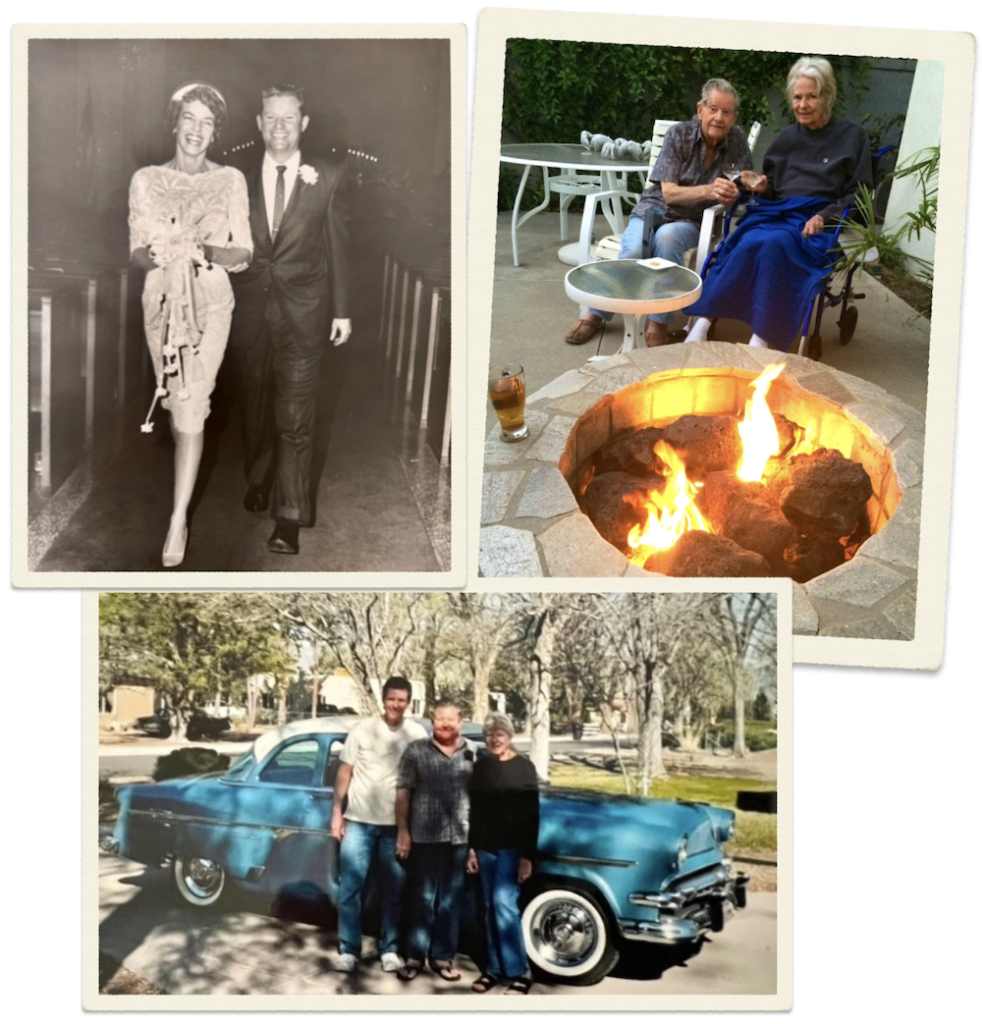
Kate: Bob, if a young person, or one of your grandchildren, came to you and asked you, what are the most important lessons you’ve learned over the course of your life, what advice would you give?
Bob: Patience and trust. If you can’t learn those or manage those, it’s very difficult to have a good relationship with anyone.
I don’t care who the person is, I give them the first shot. Anyone I meet, I give them benefit of the doubt, and trust that they’re a good person with good intentions. But if the first shot is no good, then that’s the end of it, the end of the relationship for me.
And this was absolutely true in my relationship with Margaret, and also with my kids.
And if you can’t trust someone, then there’s really nothing there. You have to have trust. Trust is the basis, the foundation of any relationship as far as I’m concerned.
I remember one year I got a greeting card from Margaret — I got a greeting card from her every Valentine’s day — and that year she wrote: I trust you. That was so important to me. Even right now, it still means so much to me. Another year she wrote: I’m proud to be your wife. And I’m proud to have you as my husband. That meant so much to me and that’s the way it was. We were very fortunate.
Kate: Why do you think you and Margaret able to have such a long marriage?
Bob: Well, you get back to the same thing: we had patience and trust with one another. If you break trust with each other it’s hard to get that relationship turned around. So you have to protect that every day if you’re living with another person.
You also have to have love and commitment.
Religion & Politics
Bob: Religion and politics are also important. And I found out in the beginning, not directly, but as directly as I thought I could, what her religion was. She was Presbyterian. And I was Presbyterian. And I found out what her thinking was as far as politics were concerned. So those are two huge things.
Kate: Why are those two important?
Bob: You just can’t have a happy marriage if you are at odds. You can, but it’s not likely if you’re at odds with your religion or politics in my experience. Although I do know one of Margaret’s long-time friends, she was Catholic, and I think her husband was Methodist, and they had a long marriage, and two children. They managed to get along.
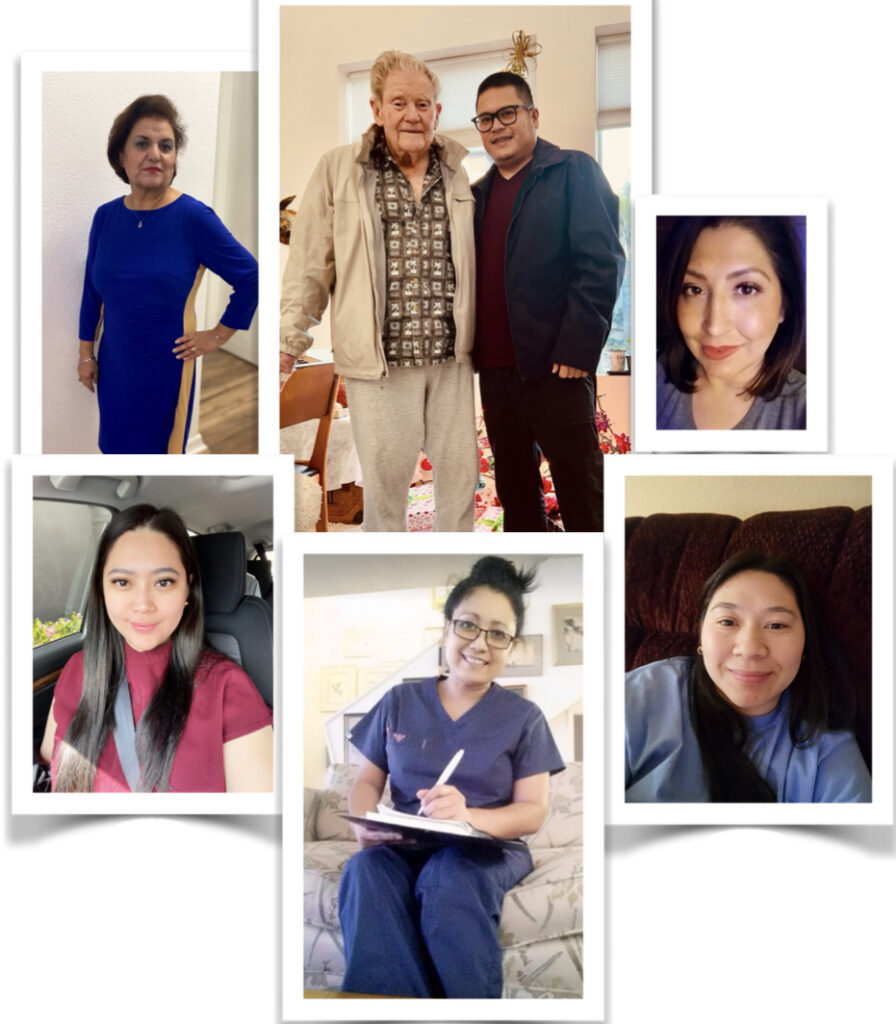
Appreciation for His Caregiver Crew
“Since Margaret was sick, Maliha has made my life possible. And Joselito and Elyta, Jennifer, and Kendy. I’ve got a good crew here. And we miss Chickie. [One of our dear caregivers who moved to Nevada in late 2021. Chickie had been with Bob for three years, since 2018.]
“I talked to her on the phone the other day. She was so good to me; I hated to see her go. She told me once: ‘You are one of the nicest men I’ve ever met.’”
We agree with Chickie, Bob!
A Minister Can Help
Kate: Bob, if a young person’s struggling in a marriage what advice would you give? How do you deal with challenges that come up?
Bob: I think the first thing they need is the help of a religious person who really has experience in counseling. No question.
Kate: Could you explain why a religious person would be able to help? Because I think a lot of young people might not understand the value of a priest or a chaplain.
Bob: Well, there are some people who are aren’t religious, but I’m not talking about them. Let’s say 70% are religious. Whether they go to church or not, they think about it, they know about it. And so they’re not opposed to a minister. They actually have some trust for a minister. And a minister has a lot of experience over the years with problems with the people in their congregation. And I think that’s why that’s a good place to start.
Communication & Kind Communication, Especially, Is Important
Bob: Communication is also really important. If you hold it in, it’s only going to grow and get bigger. If you don’t talk, you can’t communicate, and the problem gets deeper and deeper.
My parents never yelled at each other. I don’t remember them ever yelling. So I never learned that as a way to solve a problem, or to communicate. I don’t ever remember me or Margaret yelling at one another. I can’t imagine that.
Kate: So what do you do if you had some issue come up with Margaret?
Bob: I just bring it up in conversation. Don’t make a big deal out it.
We had very few arguments and I can’t think of a reason for any one of them. Most of them I probably contributed more to than she did. But we never raised our voices.
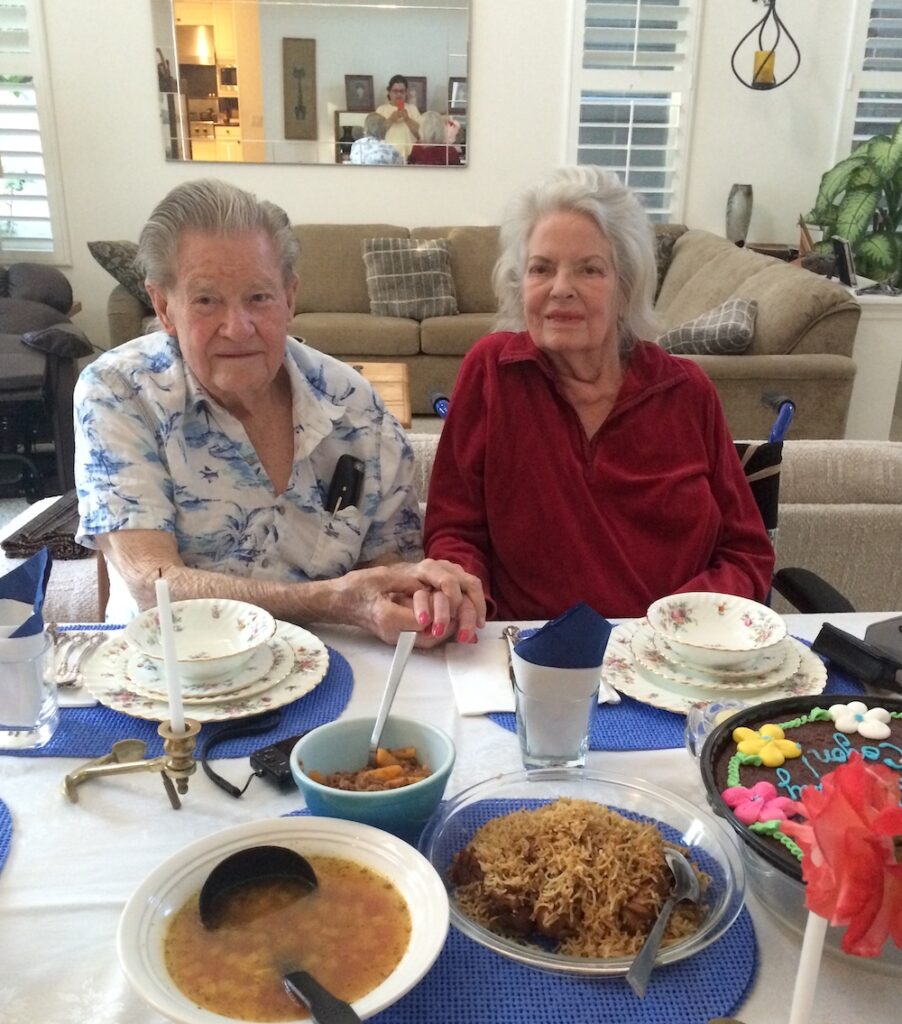
Continue to Care for Your Partner No Matter What Life Throws at You
Bob: Margaret lost the memory of our marriage after her stroke. She couldn’t remember when we were first married, some 60 years ago. Or that we were able to buy a house in Palo Verdes. She didn’t remember Palo Verdes. Her mom had given us $5,000 for a wedding present, and that was a bunch of money back then. She didn’t remember that, or that we had lived in two houses in Palo Verdes. She had no memory of those. She never really acknowledged that this was her house, even.
The caregivers would take her for a walk around the block in the wheelchair. And when they returned and would start up the front door, she would say, we can’t go in here, we haven’t been invited. So I would come to the front door. And she knew, she recognized me, but as a new person. Not as an old friend.
Kate: Oh my goodness, Bob. I didn’t realize that. Was that really painful?
Bob: Oh, yeah. But I knew that that wasn’t her. And I knew her — we had spent our life together.
Kate: Did you tell her stories from your life together and about getting married to try and help her remember?
Yeah. She really didn’t connect with them though. That was difficult. Because everything we did, we did together, so the bonding is more intense.
I imagine for a lot of people it would be really difficult to keep caring for a spouse the way you cared for Margaret, Bob.
A lot of them bail out. Especially the men.
Kate: Yeah, exactly. So why didn’t you bail out?
I married her for life. Period.
Shared Values about Money Is Crucial
Bob: Another thing that’s crucial is money. How you spend money. And if there’s a big difference between what people buy, what they’re willing to pay money for, you just can’t work together. Period.
Kate: Bob, how did you know that? Did you and Margaret discuss that before you got married? Or did you find that out as you were together?
Bob: No, I found that out right up front with all those other things like religion and politics and all the rest of them. If you don’t agree on how to spend money, I don’t think you have any chance.
If one person wants a Mercedes-Benz, or the woman wants all of the latest clothing — these might not be good examples, but you’re going get the idea — because I know a couple where the woman, she wouldn’t ride around in a Ford. Oh, no way. She just wouldn’t do it. And she wouldn’t wear anything that was around last year. And if that is not going change — and it’s usually not going change — there’s no way your relationship can survive. From what I’ve seen in some 80 years.
Margaret’s Ford
Bob: I found out about the money thing right up front when Margaret was talking about the car that she bought. She didn’t have much money then, but she knew that she had a solid job in the future. She was an elementary school teacher. So she went out looking for a Ford. She had $2,000 and way back then you could buy a brand new Chevy or Ford or a Plymouth for $2,000.
She went to a Ford dealer and said, I want you to tell me if you can sell me a Ford for $2,000, and if you can’t, I’m walking. He said, well, that’s really pretty low ball. Then he said the best I can do is $2,035. She said, no, I told you what I had to spend on the car and that’s all I can spend on a car: $2,000. And she walked away.
He called her back and said, wait minute, let me see what I can do. When he came back he said, if we take the heater out, we can sell it to you for $2,000. She said, okay, I don’t need a heater in Southern California. So they took out the heater and she paid $2,000 in cash for the car. This is a true story.
And so I thought, oh, that’s a pretty good clue that whatever her situation was, she knew what she wanted to do. And she stuck to it.
And that was the first clue I got. She told me about that story early in our relationship, probably the third or fourth date that we went on. And in fact, that Ford’s still in the family.
Physical Connection Is Also Important
Bob: And then another thing that’s not nearly as big as money, but also is important, that’s your physical connection. Some people have a big drive in that direction and some simply don’t and if they’re not in the ballpark together, it’s going be very difficult to stay together for a long time. And that may seem like some ridiculous advice, but it’s true.
Don’t Let the Challenges That Come Interfere with Your Personal Relationship
Bob: I would make some changes if I had it to do over again.
Kate: Oh really? What would you do differently now? That might be helpful for young couples, as well.
Bob: I’d cherish her every hour.
Also, if we were fussing with each other, I wish that before we went to bed, that we’d kiss each other. Period. And that it was an honest kiss. If we wanted to pick up the problem again the next morning, okay. But when we went to bed it was over. So that would also be some advice I’d give. I think it makes it very difficult to build hard feelings about or towards that person if you go to bed with an honest kiss.
Margaret and my conflicts were always pretty minor, so it wasn’t like we had a big deal going on. But if I had to do over again, that would be number one. No carry overs as far as the personal relationship is concerned. The problem, we can pick that up again tomorrow. But we can’t let it interfere with the personal relationship.
I gave this advice to a young friend a few years ago. I told him no matter what went on during the day, before you go to bed, I want you to give your wife an honest kiss. Apparently he hasn’t missed a single day and now they have kids and, they’re this tall. It makes me feel wonderful.
You Have to Be in Love
Bob: And you have to be in love. Or you can’t survive the kids.
Kate: How do you stay in love for such a long time?
Bob: Well, you have to start out with a real love. And we were lucky. Margaret and I never had to worry about falling out of love with each other. We always had real love.
Further Reading
• Why Do We Call Them the Greatest Generation? by Legacy Senior Living
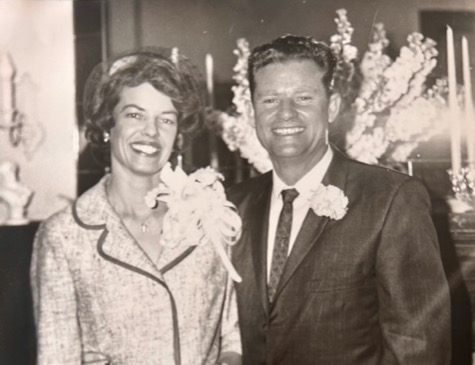
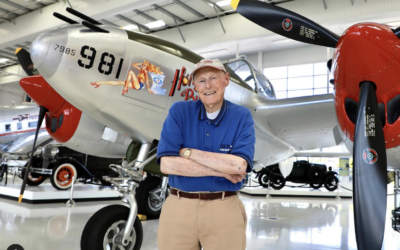


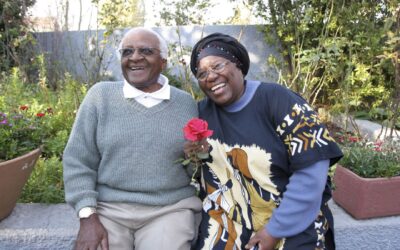
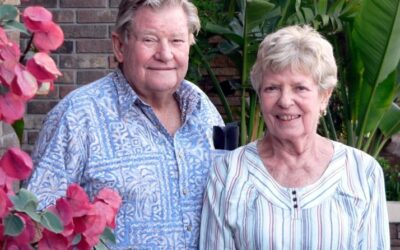
0 Comments